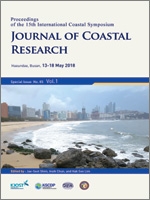Gang, Y.; Choi, J.Y.; Ra, K.; Lee, K.-W.; Chung, C.-S.; Kim, K., and Won, E.-J. 2018. Biological Impact Assessment of Sediments:A Preliminary Study for Using Pore Water and Elutriate as Exposure Media. In: Shim, J.-S.; Chun, I., and Lim, H.S. (eds.), Proceedings from the International Coastal Symposium (ICS) 2018 (Busan, Republic of Korea). Journal of Coastal Research, Special Issue No. 85, pp. 1431–1435. Coconut Creek (Florida), ISSN 0749-0208.
Biological impact assessment is required for the management of polluted sediment. Several bioassays have been performed on polluted sediment. Direct exposure to sediments is one method for evaluation of sediment toxicity and risks. However, this approach has difficulty with control of feeding and the effect on organisms. Furthermore, only macro-organisms and benthic organisms are used. In this study, we evaluate pore water and sediment elutriate as alternative media for assessing sediments. To evaluate the potential of these two alternative media, two different species of copepods with a short life cycle and ease of maintenance were each exposed to pore water and elutriate. Mortality and mRNA expression were measured in each sample. In chemical analysis, both alternative media showed much lower concentrations than the total sample. The whole sediment exposure method did not affect the mortality of the two copepods, and even resulted in enhanced hatching compared to others. The elutriate of sediments also did not cause mortality. However, pore water showed significant alterations of mRNA expression even at 24h exposure with a dose-dependent relationship. The exposure test using pore water and elutriate may provide an effective chance to assess toxicity by reducing sampling difficulties, although further studies are required to obtain more abundant data for future applications.





